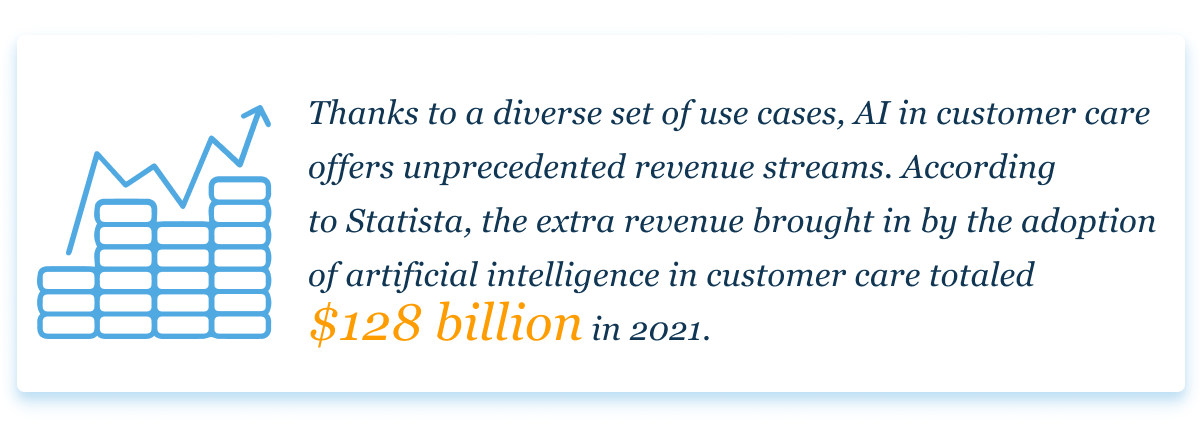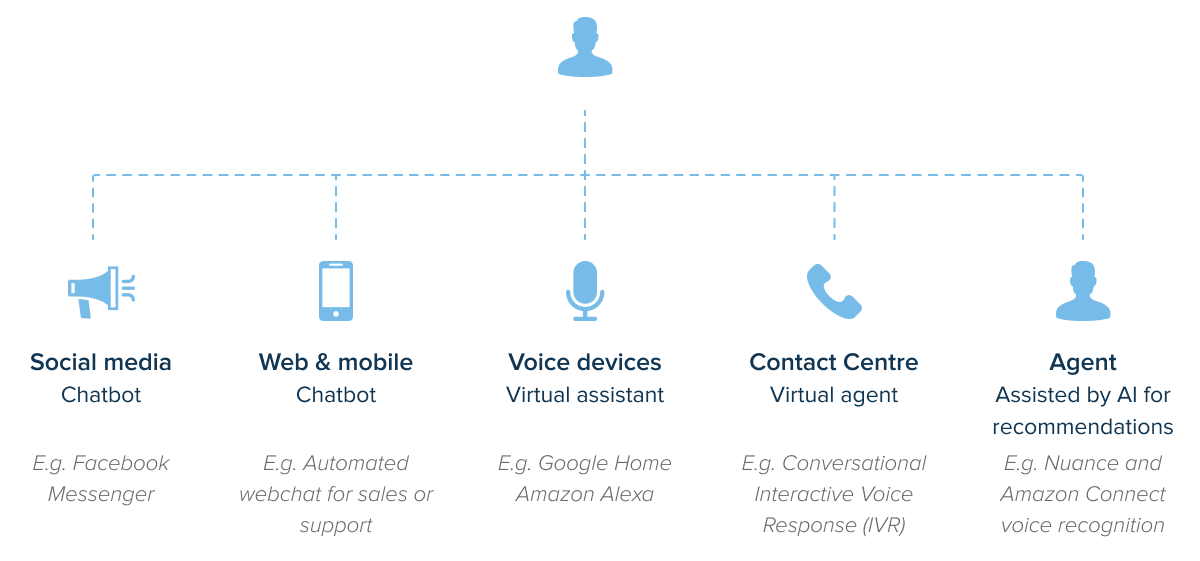In 2022, artificial intelligence will make inroads into the majority of business operations. Reduced costs, increased automation, amplified decision-making, and customer care AI benefits are among the biggest boons of smart adoption.
Today, we’ll have a closer look at AI customer care and why it topples the traditional engagement methods.
The state of artificial intelligence in customer services
AI in customer service (CX) is the use of AI software solutions to amplify the front line of global companies. An AI system can be used to analyze client data and make marketing and selling decisions based on it. Smart systems can also step in to automatically prioritize incoming calls, interact with customers and resolve issues.

How does AI affect customer service?
AI in customer care is changing the way the client interacts with brands. It can help businesses reel in more customers, increase conversions and improve the overall experience of customers. Let’s have a look at the main benefits of AI-based solutions in client relationships.
Automate repetitive tasks
Although customer management is an exciting field, it’s still filled with a lot of manual tasks. Data gathering, case classification, and other processes have low efficiency unless heavily automated. Customer care AI has a high automation potential. From case routing to canned responses, expert systems can take over a lion’s share of repetitive processes.
Reduced operational costs
The cost of CRM is a top concern for businesses of all sizes. According to statistics, the total investment into client management averages $350 billion. To bring down the costs, businesses resort to AI customer care. By automating tasks and providing commercially viable insights, machine intelligence is reducing the cost of customer service while also improving the quality of service.

Source: Unsplash
Hyper-personalization
Generic interactions are no longer profit-generating. Thus, 76% of customers expect personalization in their purchasing journeys. Smart algorithms play a paramount role in making customer journeys more contextualized. Algorithms analyze loads of client data to produce unique recommendations and marketing initiatives based on browsing or buying preferences.
For example, the real-time recommendation engine by AWS is the industry standard for producing highly personalized content. From specific product recommendations to personalized product re-ranking, it enables companies to personalize every touchpoint.
Reduced average handling times
Contact centers are among the main target adopters of artificial intelligence customer care. The average wait time within contact centers stood at 46 seconds in 2021. Natural language processing is what helps agents keep this bar high. Smart software can decrease the time spent on each interaction by automatically identifying each client. Moreover, case routing, issue classification, and automatic responses help fix customer service issues faster.

Source: Unsplash
How can AI change customer interactions?
In 2022, customer expectations are brought to the skies. Tough competition, technological advancement, and market saturation put companies on the lookout for new CX. AI-based customer service is what adds the much-needed innovation and allows you to grab your CX trophy.
Predictive algorithms for customer service analytics
Client satisfaction remains the most important KPI for businesses. Thus, the performance of over 70% of teams is evaluated based on CCR, CSS, and other client-related metrics. One of the most important applications of AI for customer care is identifying clients at risk of churning.
Predictive analytics can flag patterns in customer behavior that indicate a risk of churn. Moreover, statistical data can provide insights into the causes of churn. From a tech standpoint, systems identify churn by assigning a weighting to each variable of customer churn. Therefore, collecting data from each stage in the churn funnel is an important activity in ensuring a reliable churn dataset.

Natural language processing for satisfaction scoring
Satisfaction scoring (CSAT) is among other essential customer care AI uses. In today’s competitive marketplace, customer satisfaction is more important than ever. To measure CSAT, companies use natural language processing. The technology can analyze customer service interactions, perform customer feedback analysis, and more.
By analyzing customer reviews and other unstructured data, NLP models mark sentiment as positive or negative. This information can then be used to improve the customer experience and boost satisfaction levels.
Along with text data, algorithms can also drill down into audio calls. First, the call is automatically transcribed by speech recognition software. Then the transcript is injected into a deep neural network which makes accurate predictions about the agent’s efficiency and client’s satisfaction. On top of it, expert systems can suggest ways to optimize the client experience.
Artificial intelligence for self-service
Acing CX with smart self-service is the pinnacle of modern client pathways. But while 53% of companies trust in their self-service offerings, only 15% of consumers are satisfied with the options. Usually, the landscape of contact channels comes down to the following touchpoints:

While some client queries require an individual approach, others can be addressed with self-service capabilities. AI assistants are prominent examples of how companies can reduce the volume of queries. Smart assistants analyze queries using NLP to produce a relevant answer from a database.

Virtual agents can also orchestrate unrivaled CX in every channel – from voice to social. Thus, smart algorithms can transform traditional code-based IVR systems into interactive experiences. According to Deloitte, conversational intelligence accounts for 15-70% of cost reduction opportunities depending upon the customer channel interactions.
As for brick-and-mortar journeys, AI-enabled self-checkout systems allow shoppers to recognize objects and complete the journey with no human assistance. According to customer service stats, over 90% of millennials feel comfortable with such a self-checkout system.
AI customer care for lead prioritization
Most businesses today use some form of automation to prioritize their leads. By using data and predictive modeling, AI for customer care can help businesses identify which leads are more likely to convert and prioritize them accordingly.
There are a few different ways that smart platforms can prioritize leads. One common method is by looking at the leads’ past behavior. Also known as behavioral scoring, it helps you spot potential customers based on their sales readiness and prior engagement activities.
AI can also look at other factors like the lead’s demographics, their location, or their online behavior. In this case, profile scoring is employed to find out how well the lead fits your target audience and services. By taking all of these factors into account, smart platforms can give businesses a much better idea of which leads are worth pursuing.

Source: Unsplash
Artificial intelligence customer care for personalization
Against the backdrop of all-time high expectations and fierce competition, customers flock to companies with contextualized service and product offerings. AI customer service now accounts for all personalized offers users get during online experiences.
A smart recommendation engine relies on patterns in consumer behavior data, which can be gathered implicitly or explicitly. Purchases, browsing history, demographics, and other information are injected into the engine. Following these insights, algorithms surface items that are likely to click with the user’s interests. Reportedly, personalized recommendations make up 35% of Amazon.com’s revenue.
Email filtering for faster responses
Email remains to be among the main touchpoints between customers and businesses. According to statistics, 92% of online users use email, with 61% using it daily. A large volume of incoming email queries prompts the need for effective email sorting and routing solutions.
AI-based email sorting and routing solutions can quickly and accurately sort and route email, saving business resources. Sentiment analysis helps algorithms identify the intent behind the message and assign a specific category based on the query type, its urgency, and other parameters.
Challenges of AI customer care
Despite advantage customer care, smart algorithms also bring in intrinsic challenges. Done wrong, automated client service can backfire with irrelevant recommendations or ruined customer journeys. Let’s see what factors can add to automation challenges.
Data quality
Automated means of providing customer service imply a solid data background. To do that, companies need a single source of truth that aggregates and stores all client data across touchpoints and channels. Otherwise, algorithms will not get complete customer images, thus failing to provide experiences in alignment with customer personas.

Source: Unsplash
System integration issues
Integrating an automated CRM infrastructure requires companies to make a major leap from traditional enterprise systems to a smart suite. In some cases, an existing business ecosystem is ready for a transformation. In other instances, companies may need to create an AI-enabled system from scratch. However, both cases need dedicated resources and tech expertise.
Innovation readiness
Besides AI-ready architecture, companies have to prep personnel for embracing innovation, Staff training, clarity of roles, and new support departments require significant investment and time resources.
The final word
Excellent customer experience is the secret behind the company’s growth and increased profits. Amidst evolving preferences, crises, and competition, businesses rely on artificial intelligence to amplify their front lines. From 24/7 availability to accurate predictions, smart automation supports customers at each stage of their journeys and fosters the decision-making of global businesses.
Intelligent customer care AI solutions
Reduce costs, be more flexible, and get to market faster with AI solutions that enable you to drive efficiencies in your business. Contact our team to see how we can help you achieve that.



